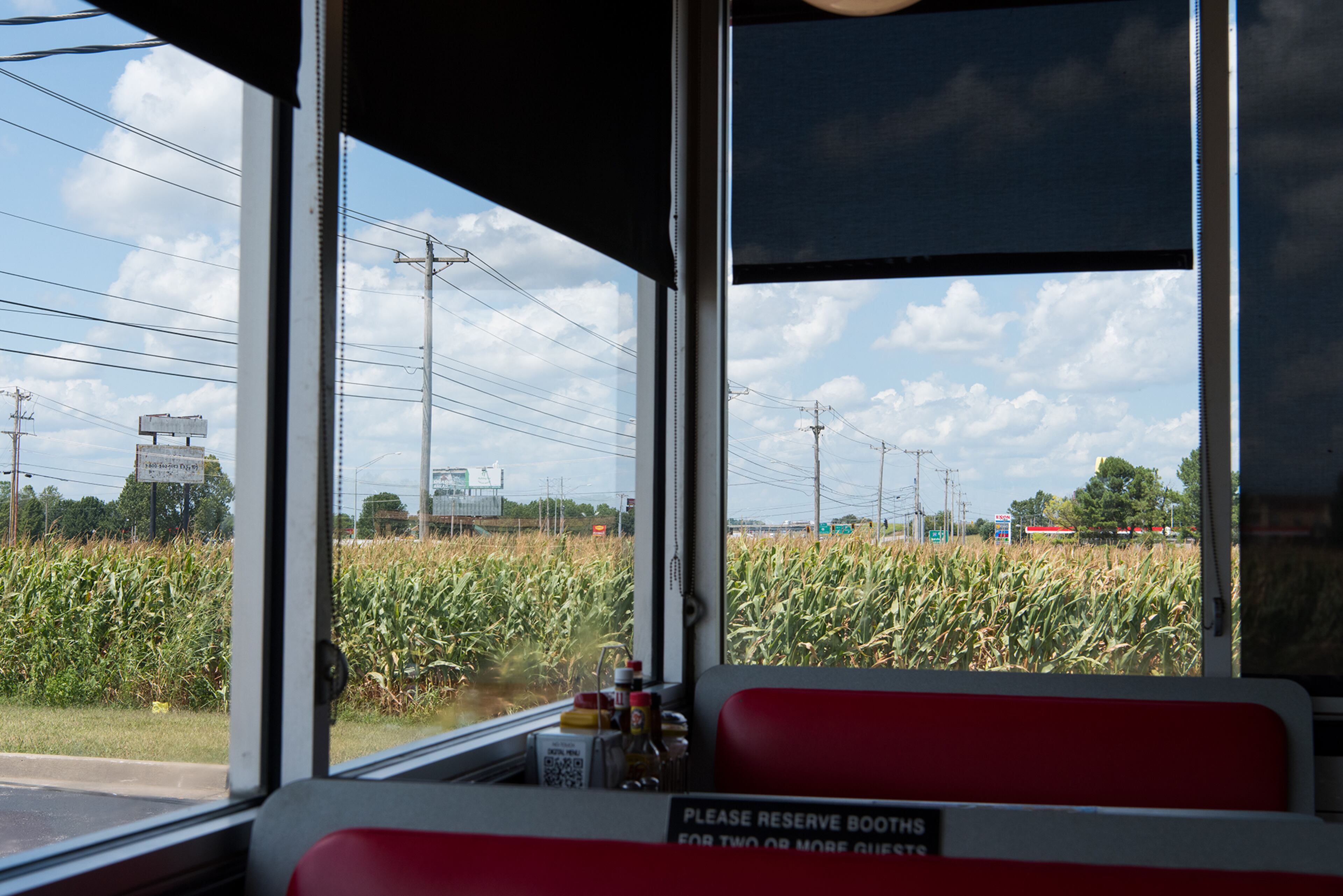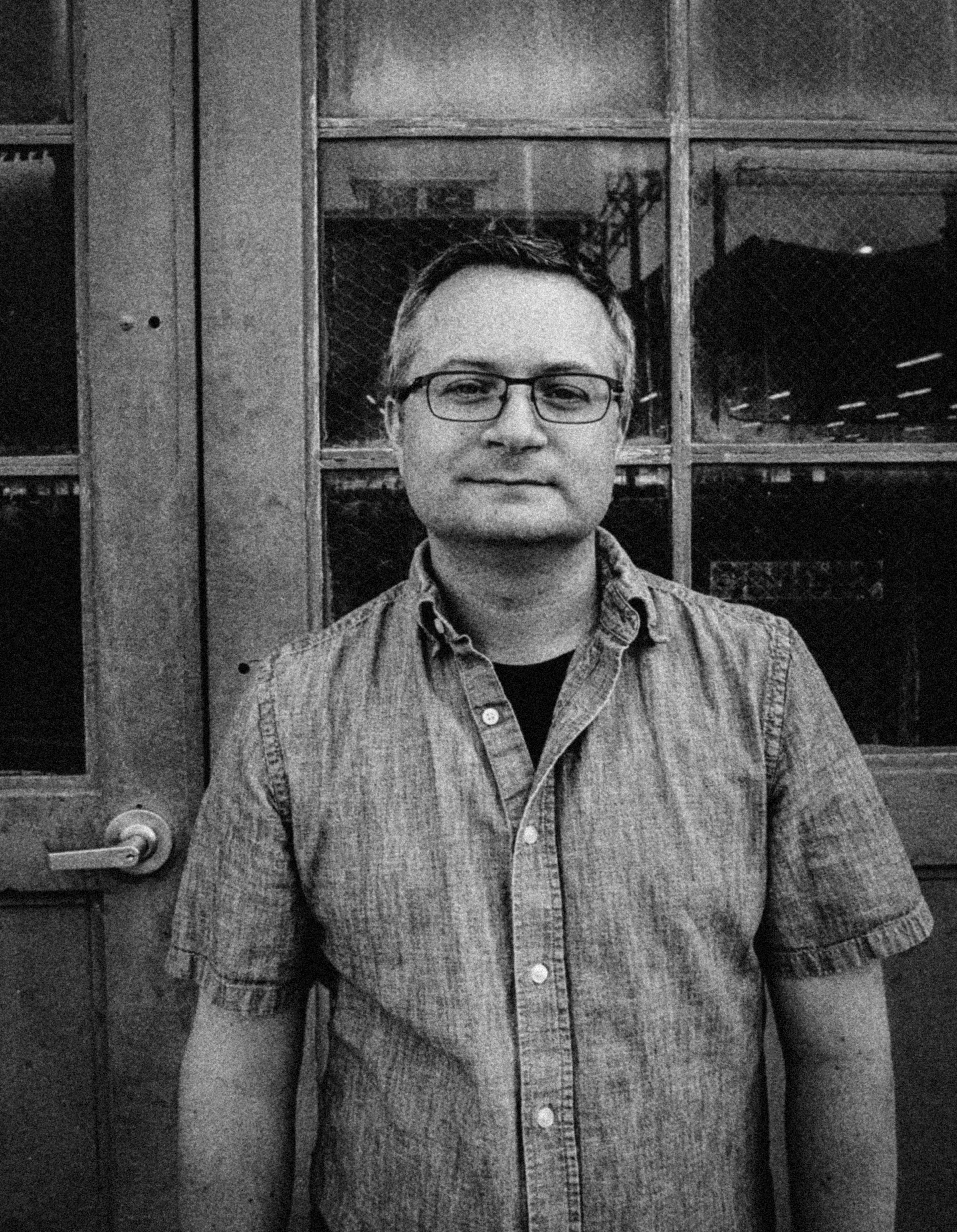Photographer captures Waffle House diners’ view of the world

Dowries of cast iron skillets, church hats and profligate use of “ma’am” are all Southern culture touchstones. But few Southernisms are as beloved and pervasive as the daffodil yellow letters and breakfast-all-day institution of Waffle House.
Founded in 1955 by two Avondale Estates neighbors Joe Rogers Sr. and Tom Forkner, the restaurant offered the novel experience of a 24-hour sit-down dining experience, 365 days a year. Over time, Waffle House’s slick booths, globe lights and bespoke breakfasts have made it a temple of cozy familiarity — the kind of comfort food you can count on in a mercurial, ever changing world, with over 2,000 locations to choose from.
How deep is the local love of those squat brick islands in a sea of concrete? A Lebanon, Tennessee, couple had their 2023 wedding reception at a Waffle House and the web is full of photographers who’ve documented engagements there complete with moony couples clutching themed coffee mugs and lovingly drowning their waffles in corn syrup.

There is even a “Waffle House Index” which uses the chain’s famously open 24-7 status to gauge the intensity of a hurricane. State officials and weather forecasters are one thing. But when Waffle House locations in Tallahassee, Florida, boarded up their windows as Hurricane Helene approached, it was a clear indication that things had taken a turn for the worse.
Now in its sixth printing, Micah Cash’s book “Waffle House Vistas” of restaurant locations across the South is a certifiable phenomenon. It was hard to keep that first edition in stock. “It kept selling out,” said Cash. Bitter Southerner co-founder Kyle Tibbs Jones won’t divulge sales figures, but Cash reckons the book has sold “tens of thousands” of copies. The book’s second edition features essays from Atlanta writers Beth McKibben and AJC senior editor Mike Jordan, and it includes more than 40 additional portraits all shot in Cash’s signature style gazing out the restaurants’ picture windows to the landscape beyond.
An arts fundraising coach and consultant based in Charlotte, North Carolina, with his wife and two children, Cash, 43, is featuring a selection of images from his popular book in a solo exhibition at the Georgia Museum of Art in Athens.
Cash, who grew up in Texas and South Carolina, began his art career as a painter before pivoting to photography. Being away from home, first in Baltimore, then attending graduate school at the University of Connecticut, made him yearn for the South. “There were things about home that I really missed that became kind of amplified and emblematic.”

But Cash sees “Waffle House Vistas,” captured from about 125 Waffle Houses, less as a salute to a Southern institution and more a conceptual art meditation on a quintessentially egalitarian American experience.
For Cash, Waffle House is a crossroads where people of different classes, life experiences, races and circumstances commune over bacon and eggs. No matter how much money you have, Cash noted, there is no way to make your Waffle House experience “premium” as you can so many other things in American life, from airplane tickets to concerts.
“You can’t go into a Waffle House and buy a VIP experience,” he said. “I don’t care how rich you are, you go to the Waffle House, there’s only 12 places to sit. You have to choose one if it’s available.”
Cash first began photographing the images, taken from inside Waffle Houses in Mississippi, Tennessee, Georgia and Alabama, in 2018. It was a challenging time; Cash had a new baby and was working three jobs. He was, he said “trying to figure out how to get my life the way I wanted it.”
As he traveled from one little town to the next taking his photographs, Cash witnessed the endless labor of the fry cooks and the smiling but exhausted servers, and it all hit a little too close to home.
It represented “the sort of very American version of poverty that we have, which is, you know that high percentage of us that are one or two paychecks away from absolute financial ruin and the precariousness of that, which we don’t like to talk about.” And it started to get to him.
“The first edition in 2019 was very much me on the road, doing all this art very quietly by myself, not showing it to anyone except for posting one image on social media every Friday,” he said.
It’s hard to look at Cash’s images and not think of Edward Hopper’s 1942 painting “Nighthawks” with its customers and short order cook isolated under the fluorescent lights in a diner’s enormous windows, together but distinctly alone.

Cash felt it when he was making his own images. “There’s very much a loneliness there, and not many people see it.”
But Cash flips Hopper’s perspective and brings us inside the diner, looking out. His vantage is the diner’s perspective seated in a booth, gazing out at a banal landscape of gas stations and fast food. In some cases, the view is more satisfying: palm trees and a sandy beach. Or a field of corn. But all the photographs are equally meditative and dreamy. Those windows to the outside are like enormous TV screens. We fugue out along with the customers as they dig into the drowsy carb load of all things smothered and covered and buttered and syruped.
“This project, is very much about looking out, having aspirations in life, thinking about your hopes, your dreams, your fears, your sacrifices and finding commonality amongst all of us. Because we have all of those together, right? We have so much more in common than we do differences in our society.”
As he took those early images, Cash’s personal circumstances added to a growing sense of ennui at seeing people struggling and never getting ahead, a workforce of perpetual “essential workers” who labor so the rest of us can eat any time we feel like it.
“I stopped making photographs for the book because I just got really depressed being in that economic space and listening to people talking about their hardships,” said Cash. “It wasn’t healthy.” He was in Canton, Mississippi, at the time and said, “I’m done,” and drove back home.
It hasn’t been hard to find people who want to talk to Cash about his images. Waffle House seems to occupy a special pleasure center in American hearts and minds.
“Most people have an affinity. Sometimes it’s a very deep affinity to a Waffle House, but it’s always for a reason. You know, like the people that might have gone on a date at that location, or they did certain things with friend groups. A Waffle House was a very important place for them at a certain time in their life, for whatever reason.
“Never in my life have I been in a space where so many people wanted to sit in that booth with me and talk about what I wanted to talk about. I made this work alone,” he said, but “I had no idea people would care.”
ART EVENT
“Waffle House Vistas.” Through June 1, 2025. Micah Cash lecture, 5:30 p.m., Nov. 7. Free. Georgia Museum of Art, 90 Carlton St., Athens. 706-542-4662, georgiamuseum.org

